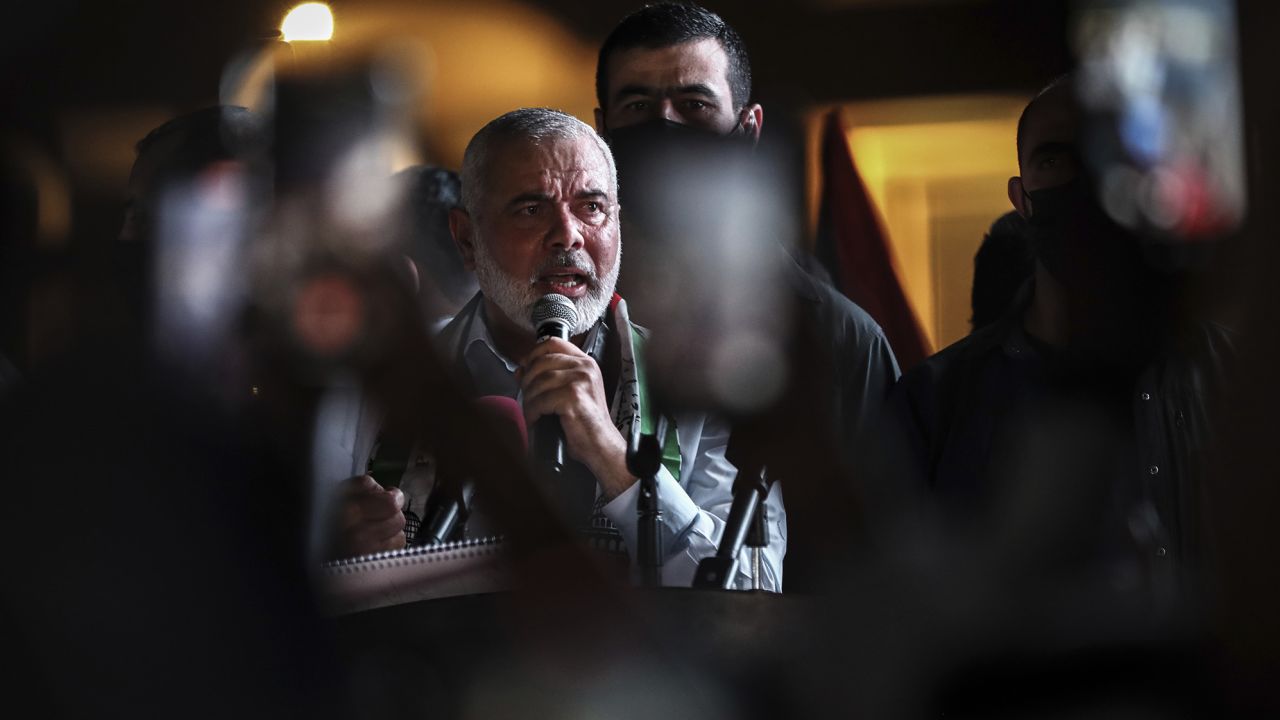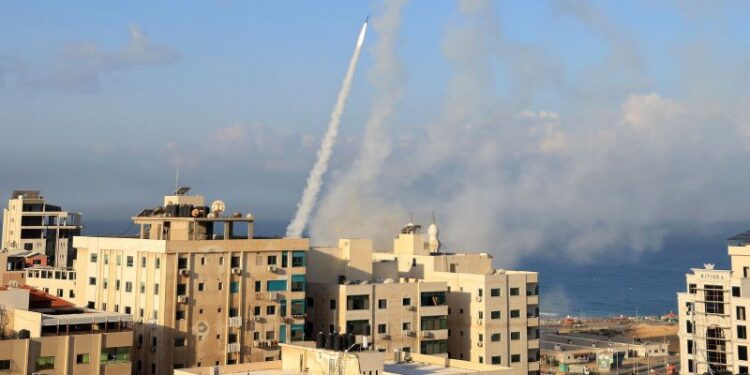Editor’s Note: A version of this story appears in CNN’s Meanwhile in the Middle East newsletter, a three-times-a-week look inside the region’s biggest stories. Sign up here.
CNN
—
The brazen attack by Palestinian militant group Hamas on Israel that began on Saturday will be seen as a turning point in the Palestinian-Israeli conflict with far-reaching repercussions, analysts say.
The multi-pronged attack saw as many as 1,000 assailants infiltrate Israeli territory, kill hundreds of soldiers and civilians, and take dozens of hostages back into Gaza. It was like nothing Israel had seen since the 1948 Arab-Israeli war.
Israel pledged revenge, with Israeli Prime Minister Benjamin Netanyahu vowing “mighty vengeance.” Hamas said it was prepared for all scenarios.
“Things will change forever,” said Kobi Michael, a senior researcher at the Institute for National Security Studies (INSS) in Tel Aviv. There is nothing in Israeli history that compares to this attack, he said.
“Hamas will no longer be Hamas that we knew years ago,” Michael, who previously served as the deputy director general and head of the Palestinian desk at Israel’s Ministry for Strategic Affairs, told CNN.
Hamas said the attack was retribution for what it described as attacks on women, the desecration of the al-Aqsa mosque in Jerusalem and the ongoing siege of Gaza.
Here’s what we know about the group:
An Islamist organization with a military wing, Hamas first came into being in 1987. It was an offshoot of the Muslim Brotherhood, a Sunni Islamist group that was founded in the late 1920s in Egypt.
The word “Hamas” is itself an acronym for “Harakat Al-Muqawama Al-Islamiyya” – Arabic for Islamic Resistance Movement. The group, like most Palestinian factions and political parties, insists that Israel is an occupying power and that it is trying to liberate the Palestinian territories. It considers Israel an illegitimate state.
Unlike some other Palestinian factions, Hamas refuses to engage with Israel. In 1993, it opposed the Oslo Accords, a peace pact between Israel and the Palestine Liberation Organization (PLO) that saw the PLO give up armed resistance against Israel in return for promises of an independent Palestinian state alongside Israel. The Accords also established the Palestinian Authority (PA) in the Israeli-occupied West Bank.
Hamas presents itself as an alternative to the PA, which has recognized Israel and has engaged in multiple failed peace initiatives with it. The PA, whose credibility among Palestinians has suffered over the years, is led by President Mahmoud Abbas.
The group has over the years claimed many attacks on Israel and has been designated as a terrorist organization by the United States, the European Union, and Israel.
The US State Department in 2021 said that Hamas receives funding, weapons, and training from Iran, as well as some funds that are raised in Gulf Arab countries. The group also receives donations from some Palestinians, other expatriates and its own charity organizations, it said.
In April, Israeli Defense Minister Yoav Gallant suggested that Iran provides Hamas with some $100 million annually.
By undertaking such a devastating strike, the group’s primary goal would have been to dramatically shake up the status quo, experts say: Israel maintains a tight siege on Gaza and continues to occupy the West Bank, and the goal of an independent Palestinian state is nowhere in sight.
One objective would be to put the Palestinian issue back on the regional and international agenda, said Khaled Elgindy, a senior fellow at the Middle East Institute and director of its Program on Palestine and Israeli-Palestinian Affairs.
“People had moved on (from the Palestinian issue),” Elgindy told CNN. “The new game in town is Saudi-Israel normalization, and this new regional integration.”
Saudi Crown Prince Mohammed bin Salman last month publicly acknowledged for the first time that negotiations were underway with Washington to possibly establish ties with Israel, saying normalization is getting “closer” every day. Saudi-Israel normalization could be a landmark moment for Israel’s regional legitimacy as it might prompt other Muslim countries to follow suit. Saudi Arabia had previously pledged not to recognize Israel until it grants independence to the Palestinians.
Elgindy said that, to some extent, Hamas has succeeded in its aim of bringing attention back to the Palestinian cause.
The group may also be trying to shatter any conceptions about its military capabilities, analysts say.
Hamas had delivered “a blow to Israel beyond what it is used to,” and was also putting its capabilities on display, said Omar Rahman, a fellow at the Middle East Council on Global Affairs who focuses on Palestinian affairs. Its shock tactics are a declaration that it “must be taken more seriously,” Rahman said.
The Israeli military said Monday that Hamas had taken “dozens” of hostages and Hamas has said it has abducted more than 100 people. The number of hostages taken, and the fact that many are civilians, shows that Hamas is looking for much more than a prisoner swap, the experts said. In a previous kidnapping situation, Israel traded more than 1,000 prisoners for one Israeli hostage.
The large number of hostages ensures that “this is not a short-lived military tit-for-tat that will die down and be forgotten,” Rahman said, “but that it has longer-term political implications.”
As part of its campaign against Israel, Hamas produced slick propaganda videos documenting its assault on Israel step-by-step. In some videos, its fighters wore bodycams to film the operations as they broke through Israeli fortifications and were seen dressed in commando-style uniforms.
That’s key to the group’s propaganda war, analysts say, which serves a number of objectives.
On the one hand, it is to “instill fear” among the Israeli public and imply that their leaders can’t keep them safe, Elgindy said. “That is going to come as a shock because Israelis take enormous pride in their military and their intelligence capabilities.”
On the other hand, it is also for domestic Palestinian consumption. Hamas has been long caught in a political war with the Palestinian Authority, which governs the West Bank and engages in security coordination with Israel.
This is meant to show Palestinians that “while over there, Abu Mazen (Mahmoud Abbas, the Palestinian Authority president) … is basically asleep at the wheel, we are the true resistance, (and) are actually doing something,” Elgindy told CNN of Hamas.

Hamas’ large-scale offensive shows that the group knows that the coming war may be an existential one, experts say.
Michael, of the INSS, speculates that Hamas may have been trying to provoke an all-out war with Israel, and may have been promised regional backing by its allies should it take place.
“Hamas… has had a very clear strategy which is based on the organizing rationale of a multi-front conflict,” Michael told CNN, adding that Hamas sees Gaza, Jerusalem, the West Bank, the Arab citizens of Israel who support Hamas, and southern Lebanon as potentially supporting its campaign.
A senior Hamas official, Saleh al-Arouri, over the weekend said the militant group was ready for the “worst-case scenario, including a ground invasion.”
He said that the ground invasion would be “the best for us to decide the ending of this battle.”











































Discussion about this post